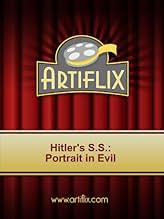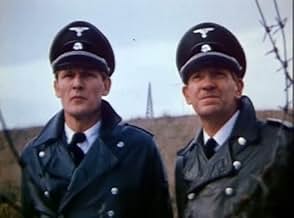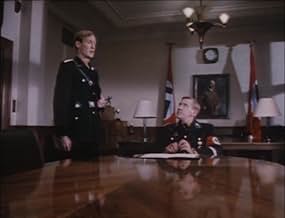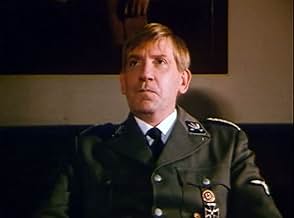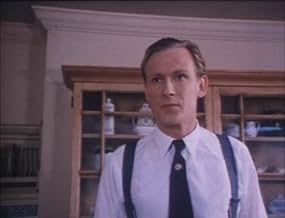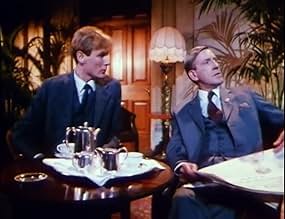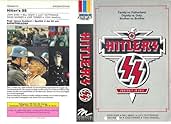Hitler's S.S.: Portrait in Evil
The story of Helmut and Karl Hoffmann. Both come of age at the start of Hitler's power in Germany. Helmut joins the SS and eventually becomes a successful flag rank officer. Karl joins the S... Read allThe story of Helmut and Karl Hoffmann. Both come of age at the start of Hitler's power in Germany. Helmut joins the SS and eventually becomes a successful flag rank officer. Karl joins the SA and experiences the darker side of Nazism after the SA is disbanded and Karl is thrown i... Read allThe story of Helmut and Karl Hoffmann. Both come of age at the start of Hitler's power in Germany. Helmut joins the SS and eventually becomes a successful flag rank officer. Karl joins the SA and experiences the darker side of Nazism after the SA is disbanded and Karl is thrown into prison and later conscripted into the German army. Brother is pitted against brother u... Read all
- Director
- Writer
- All cast & crew
- Production, box office & more at IMDbPro
Featured reviews
This film does an excellent job in examining the motivations of Nazis, and of human feelings through Karl and Helmut's sibling rivalry. The acting was excellent, featuring Jose Ferrer as Helmut's old teacher, who is a Jew. However, I found the actress playing Mitzi to be repulsively vacuous. Tony Randall's cameo appearance was brilliant, among others.
Where this film fails is that it tries to do too much. Ity tries far too hard to address every issue involved in discussing the Third Reich, from Anti-Semitism, to the cause of the war, to the Hitler Youth, to propaganda, and so forth. This causes much superficiality, so that none of these topics is thoroughly addressed. The largest strength to this film, is that it so bravely and accurately portrays a historic episode, known as the Night of the Long Knives, in which Hitler has Röhm, and his SA leadership killed, presumably because they were planning a Putsch against Hitler. It re-examines an old issue, and it does it cunningly.
Although it covers a span of '33 to '45, none of the actors age noticeably, the one weakness in an otherwise carefully detailed production.
This is not the first time this sort of subject has been handled. A less epic, more narrowly focused melodrama of two brothers with opposing viewpoints was made in the 1940s (UNDERGROUND - 1941) with JEFFREY LYNN and PHILIP DORN as German brothers taking opposite viewpoints of the wartime philosophy and directed by Vincent Sherman. Although it was a well done melodrama, it did not attempt to get the full flavor of the Third Reich and its various operations as this film does.
JOHN SHEA is especially impressive as the brother who speaks his mind against some of the Nazi practices and at one point even ends up for awhile in Dachau, the concentration camp. The other brother manages to get him released but there are still many trials and tribulations for both of them before the film reaches a dramatic climax. CARROL BAKER does a nice job as a worried German mother.
David WARNER is impressive as Reinhard Heydrich, the sarcastic and brutal Nazi officer who gets his comeuppance before the war is over. All of the performances are first rate and the story covers a good deal of actual history without ever losing track of its main characters.
Absorbing stuff, lengthy, but well worth watching.
The movie talks about various historic events , such as the confrontation between ¨SA¨ and ¨SS¨ , taking place ¨The Night of the Long Knives¨ , it was a purge that took place in Nazi Germany from June 30 to July 2, 1934, when the Nazi regime carried out a series of political murders. Leading figures of the left-wing Strasserist faction of the Nazi Party, along with its figurehead, Gregor Strasser, were murdered, as were prominent conservative anti-Nazis . Many of those killed were leaders of the Sturmabteilung (SA), the paramilitary Brownshirts . Adolf Hitler moved against the SA and its leader, Ernst Röhm, because he saw the independence of the SA and the penchant of its members for street violence as a direct threat to his newly gained political power . At least 85 people died during the purge, although the final death toll may have been in the hundreds, and more than a thousand perceived opponents were arrested. Most of the killings were carried out by the Schutzstaffel (SS) and the Gestapo (Geheime Staatspolizei), the regime's secret police .Röhm was held briefly at Prison in Munich, while Hitler considered his future. In the end, Hitler decided that Röhm had to die . On July 1, at Hitler's behest, Theodor Eicke, later Commandant of the Dachau concentration camp, and SS Officer Michel Lippert visited Röhm and killed him . Furthermore , ¨The night of the broken glass¨ , as the night of November 9, 1938, when terror attacks were made on Jewish synagogues and stores. Two days earlier, Vom Rath, Third Secretary of the German Embassy in Paris , had been assassinated by Grynszpan, a Polish Jew. In retaliation, Himmler and Reinhard Heydrich, chief of the SD, ordered the destruction of all Jewish places of worship in Germany and Austria . The assault had been long prepared , the murder provided an opportunity to begin the attack. In fifteen hours 101 synagogues were destroyed by fire and 76 were demolished . The pillage and looting went on through the night , streets were covered with broken glass , hence the name Kristallnacht . Reinhard Heydrich artificer of the meeting of senior officials of Nazi Germany, held in the Berlin suburb of Wannsee on 20 January 1942. The purpose of the conference, called by director of the Reich Main Security Office; RSHA, SS-Obergruppenführer Reinhard Heydrich, was to ensure the cooperation of administrative leaders of various government departments in the implementation of the final solution to the Jewish question, whereby most of the Jews of German-occupied Europe would be deported to Poland and murdered . Later on , Heydrich leaves Berlin to take up a new posting as Nazi Governor of Bohemia and Moravia (Czechoslovakia) and there happens Heydrich's assassination, which being well recreated . Other events being finely narrated are the followings : Destruction radio station incriminating Polish rebels and subsequent Poland encroachment (1939) , siege and defeat Stalingrado (1943) , battle and fall Berlin (1945) .
Did you know
- GoofsIn the film, Reinhard Heydrich is shown assassinated on a deserted country road in the farmland outside the city of Prague. In reality, Heydrich was attacked in the middle of the city when his car slowed to round a corner at a busy streetcar station.
- Quotes
Helmutt Hoffmann: Well, who needs Revolutionaries when the Revolution has already been achieved?
- Alternate versionsIn the version of the film shown on the History Channel's "Movies in Time" series, about 30-45 minutes of dialogue is cut from various scenes and conversations. This was necessary to have the running time under three and a half hours to allow for the Movies in Time commentary and interviews at the beginning and end of the feature.
- SoundtracksWenn die Soldaten,
sung on train to the Night of the Long Knives

